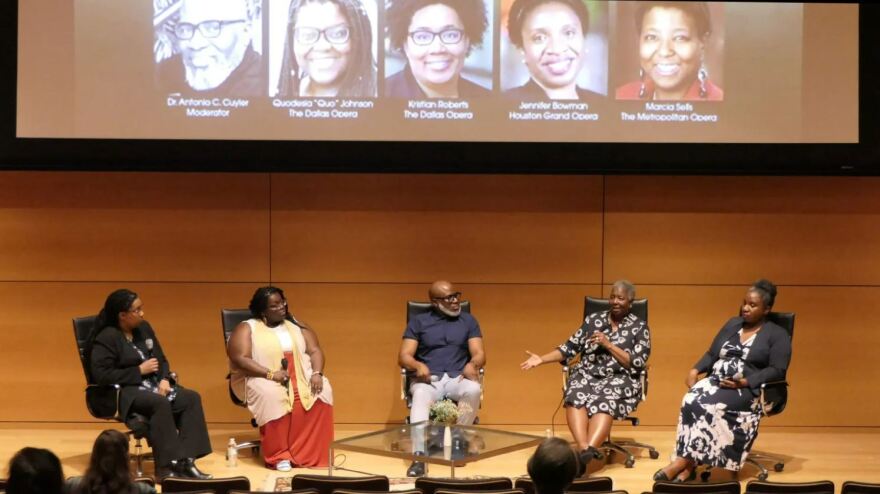Calling it a “global problem,” the Fort Worth Opera sent a strong signal that their diversity, equity, inclusion and accessibility work is not over, with a pair of panels aimed at directly addressing the issues as they relate to the arts.
Ahead of the first discussion, Fort Worth Opera’s Director of COT Production and Civic Impact Sheran Goodspeed Keyton told the Fort Worth Report that this work can not rest on just one person or group of people.
“It’s everybody’s work. It’s everybody’s issue. This is a global problem. This is a problem that we all have together,” she said. “And it can’t be remedied even a little bit unless we all work together as an arts community, as an educational system, everyone.”
The first of the panels on April 13 did not tiptoe around the recent departure of former artistic and general director Afton Battle. Battle was the first woman and first Black general director to lead the Fort Worth organization — and one of “very few” Black women at the helm of a major opera across North America.
Moderator Antonio Cuyler began the discussion by crediting Battle for conceptualizing the event and panelist Quodesia Johnson, education and company culture manager at the Dallas Opera, read a letter of support for Battle that was published by the Black Administrators of Opera in December of last year, following news of her departure.

But her tenure was not the focus of the discussion.
Instead, music professionals with experience working at The Met Opera, The Kennedy Center and opera companies in Houston and Dallas, discussed the history of the art form and how politics, equity and inclusion have always been present — even if the vocabulary and the way in which the topics are discussed has changed.
“The bigger question is what is political? Is political a matter of policy? What are we creating policy for? What are we trying to regulate?” Johnson asked. “And is it a matter of how we live and experience our lives? So if we are creating policy directly related to how we experience our lives, why would art not also reflect how we experience our lives?”
Dallas Opera’s Director of Education Kristian Roberts pointed to several operatic works that were inherently political, even those that were penned centuries ago.
“If you go look at the Figaro Trilogy that Beaumarchais wrote, they banned that and they plumb near ran him out of town because he was talking about the aristocracy,” she said. “And then Mozart comes along a little later and sets the marriage of Fiagaro to music and he tamped it down a little bit and everyone was laughing – including the aristocracy. And he didn’t get run out of town, but he still made his point in calling out the aristocracy.”
Marcia Sells, the Met Opera’s first Chief Diversity Officer, said that the need to diversify and grow audiences was critical for arts organizations long before calls to action gained national momentum following the killing of George Floyd in 2020.
“The houses weren’t full and the tickets weren’t selling … the reality is we still need human beings in seats,” she said. “If we age out of an audience, what impact are we going to be able to have? … We absolutely have to look at how we are telling stories to bring in a new generation of audience so that we don’t disappear.”
The opera will keep the conversation going with a second panel that will discuss casting and the company’s current production of “Aida.” The conversation will be held 1 p.m. on April 15 in the auditorium at the Modern Art Museum of Fort Worth.
Marcheta Fornoff covers the arts for the Fort Worth Report. Contact her at marcheta.fornoff@fortworthreport.org or on Twitter. At the Fort Worth Report, news decisions are made independently of our board members and financial supporters. Read more about our editorial independence policy here.


